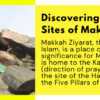Masjid Aisha Meeqat A Spiritual Gateway for Pilgrims Embarking on Umrah
Masjid Aisha, also known as Masjid at-Tan’eem, holds a special place in the hearts of millions of Muslims worldwide. Located just a few kilometers from the Kaaba in Makkah, this mosque is not only a sacred space for prayer but also serves as one of the designated Miqat points for pilgrims intending to perform Umrah. For many, Masjid Aisha is the starting point of a deeply spiritual journey, marking the moment they enter into the state of Ihram (a state of ritual purity) as they prepare to perform the Umrah pilgrimage.
In this blog, we will explore the significance of Masjid Aisha Meeqat, its historical background, the rituals associated with this sacred site, and practical tips for pilgrims.
Historical and Religious Significance
Masjid Aisha is named after Aisha bint Abu Bakr (RA), the beloved wife of the Prophet Muhammad (PBUH). The mosque is situated in the district of Tan’eem, approximately 7.5 kilometers (4.7 miles) from the Holy Kaaba. It is one of the five Miqat points, the others being Dhul Hulayfah (also known as Abyar Ali), Al-Juhfah, Qarn al-Manazil, and Yalamlam. These Miqat points are specific locations where pilgrims intending to perform Hajj or Umrah must don the Ihram and make the intention (niyyah) to enter the holy state before proceeding towards Makkah.
The mosque’s association with Aisha (RA) dates back to an event during the lifetime of the Prophet Muhammad (PBUH). After performing Hajj, Aisha (RA) expressed her desire to perform Umrah. The Prophet Muhammad (PBUH) instructed her to go to Tan’eem, where she entered into the state of Ihram and performed Umrah. Since then, the mosque has been a key location for those who wish to renew their Ihram while in Makkah, especially for residents or pilgrims who have already completed Hajj or an Umrah and wish to perform another Umrah.
The Importance of Ihram and Niyyah
The state of Ihram is a critical component of both Hajj and Umrah. It involves wearing specific garments (two unstitched white sheets for men and simple, modest clothing for women) and adhering to a series of prohibitions designed to foster humility, equality, and spiritual focus. The act of entering into Ihram is accompanied by the intention (niyyah), a declaration made by the pilgrim that they are undertaking the sacred journey solely for the sake of Allah.
At Masjid Aisha, pilgrims prepare for this profound transformation. The mosque offers ample facilities for purification (ghusl) and changing into the Ihram garments. Once dressed in Ihram, pilgrims perform two units of prayer (rak’ahs) and then make the intention for Umrah, reciting the Talbiyah:
“Labbayk Allahumma Labbayk, Labbayk La Shareeka Laka Labbayk, Innal Hamda Wanni’mata Laka Wal Mulk, La Shareeka Lak.” (Here I am, O Allah, here I am. Here I am, You have no partner, here I am. Verily all praise, grace, and sovereignty belong to You. You have no partner.)
This moment marks the beginning of the spiritual journey toward the Kaaba, with the pilgrim now fully immersed in the sacred rituals of Umrah.
The Experience at Masjid Aisha
Masjid Aisha is a beautifully designed mosque, combining traditional Islamic architecture with modern amenities. It is well-equipped to handle the large number of pilgrims who pass through its doors daily, especially during the peak seasons of Hajj and Umrah. The mosque’s serene atmosphere provides a peaceful space for reflection and prayer, allowing pilgrims to mentally and spiritually prepare for the journey ahead.
The mosque is spacious, with separate areas for men and women to perform their prayers and prepare for Ihram. The ablution facilities are clean and well-maintained, ensuring that pilgrims can perform their purification rituals without any inconvenience. There are also plenty of shops nearby where pilgrims can purchase Ihram garments, prayer mats, and other essentials for their journey.
The surrounding area of Tan’eem is relatively quiet, offering a stark contrast to the bustling environment of the Masjid al-Haram. This tranquility helps pilgrims focus on their intentions and the spiritual significance of their journey. Many pilgrims choose to spend some time in contemplation and prayer at Masjid Aisha before heading back to the Holy Mosque for the Tawaf (circumambulation of the Kaaba) and Sa’i (the ritual walking between the hills of Safa and Marwah).
Practical Tips for Pilgrims
- Transportation: Masjid Aisha is easily accessible from Makkah by taxi or bus. Many hotels in Makkah offer shuttle services to and from the mosque, especially during the Umrah season. If traveling by taxi, it’s advisable to agree on the fare beforehand to avoid any misunderstandings.
- Timing: While the mosque is open 24 hours a day, it’s best to visit during off-peak hours to avoid the crowds. Early mornings or late evenings are typically quieter times, allowing for a more peaceful experience.
- Preparation: Before heading to Masjid Aisha, ensure you have everything you need for Ihram, including the garments, prayer beads, and any necessary documents. It’s also helpful to familiarize yourself with the steps of Umrah to make the process smoother.
- Spiritual Readiness: Take time to engage in personal reflection and prayer before entering into Ihram. Understanding the significance of Ihram and making a sincere intention (niyyah) can enhance your spiritual experience.
- Stay Hydrated: The climate in Makkah can be hot, especially during the summer months. Make sure to stay hydrated by drinking plenty of water, and consider carrying a small bottle with you.
Masjid Aisha Meeqat is not just a starting point for the Umrah pilgrimage; it is a place where spiritual transformation begins. As pilgrims don their Ihram garments and make their intention, they step into a state of purity, humility, and devotion, ready to undertake one of the most sacred journeys in Islam. The tranquility and historical significance of Masjid Aisha make it an ideal location for pilgrims to prepare themselves, both physically and spiritually, for the rites of Umrah.
Whether you are embarking on your first Umrah or returning for another spiritual journey, the experience at Masjid Aisha is sure to leave a lasting impact on your heart and soul, deepening your connection to your faith and the timeless rituals of Islam.












